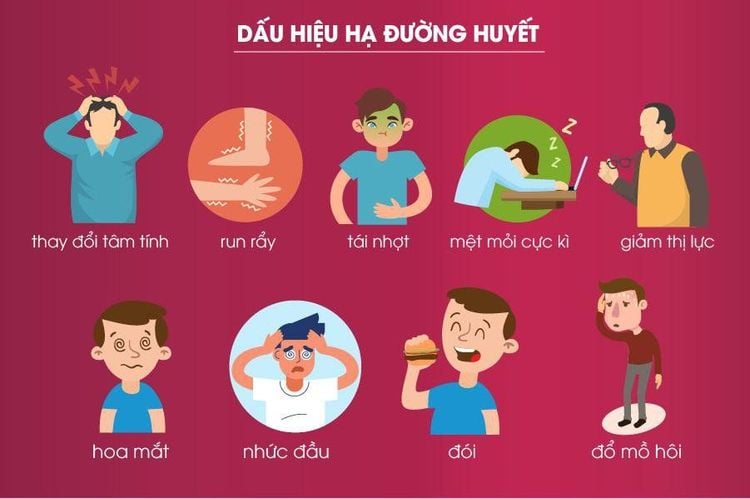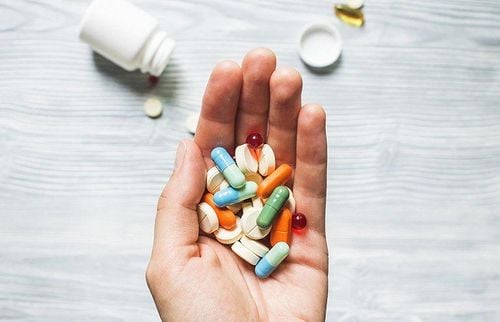The article was professionally consulted with MD Tran Quoc Tuan - Head of the resuscitation unit - ICU - Department of Emergency Resuscitation - Vinmec Phu Quoc International General Hospital.
Hypoglycemia is a common condition. It may not pose any danger if the symptoms are mild, but it can become a medical emergency if it persists and is not treated in time. Morning hypoglycemia is the most commonly encountered case.
1. Causes of morning hypoglycemia
Hypoglycemia occurs when blood sugar levels drop too low, usually below 3.9mmol/L (<70mg/dL), resulting in glucose deficiency. The direct consequence is that the body's functions become disrupted, with symptoms such as fatigue, dizziness, and headaches quickly appearing.
Everyone should be cautious about morning hypoglycemia, as it is a time when blood sugar levels are most likely to drop. After a long night of fasting, blood sugar levels decrease, and if no solution is provided upon waking, it can lead to dangerous complications. The blood sugar levels during this period are also referred to as fasting hypoglycemia.
Normally, the liver has the ability to release stored sugar when needed. Therefore, the body rarely allows blood sugar levels to drop to dangerous levels. However, there are still some causes of morning hypoglycemia.
- Pregnancy: Pregnant women are more likely to experience morning hypoglycemia because they need to consume more calories to support the developing fetus. As a result, they are prone to nutrient deficiencies, and their blood sugar levels can easily be depleted without adequate replenishment.
- Alcohol, beer, and stimulants: Stimulants, as well as alcohol, can increase the risk of hypoglycemia because alcohol interferes with the process of glucose production in the body. This is especially the case for individuals who drink alcohol without eating and then go to sleep, making them more likely to experience hypoglycemia upon waking.
- Medications: Patients who regularly use medications such as sulfonylureas or insulin for diabetes or pentamidine for pneumonia may be at risk for hypoglycemia.
- Unhealthy eating habits: This often occurs in people who diet excessively, aim to lose weight, or have conditions requiring special diets. When the body does not absorb enough carbohydrates, it leads to a shortage of the necessary glucose.
- Underlying conditions: Patients with cancer or large tumors consume a significant amount of glucose and release insulin, which can contribute to hypoglycemia.
2. Symptoms of morning hypoglycemia
Symptoms of hypoglycemia are often quite easy to recognize. Symptoms will appear gradually and will become more severe over time. Common symptoms of morning hypoglycemia will be restlessness, tremors, hand tremors, and feeling hungry. At that time, the patient's body will lose coordination, become irritable, have headaches, and have difficulty concentrating at work.
If blood sugar levels continue to decrease, the symptoms will become more severe when the heart rate becomes faster, nausea, stomach pain, dizziness, etc. More seriously, if this disease is not treated, it will directly lead to blurred vision, fainting, loss of consciousness, and seizures.

3. How to address morning hypoglycemia
Morning hypoglycemia can be caused by various factors. Therefore, it is important to seek immediate medical attention and undergo an examination when experiencing any of the related symptoms to determine the most effective treatment approach.
Typically, waking up with hypoglycemia is due to the body being deprived of food for an extended period. Hence, breakfast is a very important meal that should never be skipped for any reason. The solution to fasting hypoglycemia is to immediately prepare a full meal that is rich in glucose, and consider adding sweet fruits or fruit juices.
For hypoglycemia caused by side effects of diabetes medications, it's important to quickly discuss the condition with your doctor. Adjusting the medication dosage or supplementing glucose through dietary changes may be recommended.
For hypoglycemia induced by alcohol, the most effective solution is to limit or eliminate alcohol consumption. However, in unavoidable circumstances, it is crucial to eat a balanced meal both before and after drinking to prevent glucose depletion.

4. Preventing Morning Hypoglycemia
Hypoglycemia is generally not a highly dangerous condition, but if it persists for too long or is caused by complications from other diseases, it can be extremely risky and even life-threatening.
Whether or not fasting hypoglycemia has occurred, everyone should undergo regular health check-ups. Especially for individuals over the age of 45, it is recommended to check fasting blood sugar levels 2 to 3 times a year to rule out any potential severe conditions.
A balanced diet is a useful measure to prevent hypoglycemia. The most appropriate diet includes sufficient carbohydrates and high fiber intake, as fiber helps slow down glucose absorption and prevents low blood sugar levels in the morning. It is also beneficial to divide meals into smaller portions throughout the day instead of just having three large meals.
Please dial HOTLINE for more information or register for an appointment HERE. Download MyVinmec app to make appointments faster and to manage your bookings easily.
Reference sources: suckhoedoisong.vn, naydautien.vn, dieutri.vn
To arrange an appointment, please call HOTLINE or make your reservation directly HERE. You may also download the MyVinmec app to schedule appointments faster and manage your reservations more conveniently.








